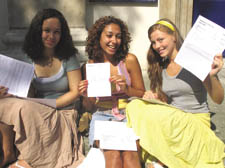|
|
 |
| |

Not all students will be so happy this week |
Clear the minefield of disappointing A-levels
Exam results will bring heartbreak to many this week but a clearing expert passes on his top tips to Jane Wild
FORTY-THREE thousand students gain admission to university through clearing each year, a process that begins the day the A-level results are announced.
This largely consists of students who failed to get the grades they expected.
Calling universities to find out what courses are available and making quick decisions about the next three years can be a frantic experience for which many are unprepared.
Mark Bickerton, director of student recruitment at London Metropolitan University has been in the job 18 years, offers advice on how to deal with disappointing grades.
• “First, phone the university you originally wanted.
“If you are one grade short, for example if you received A, B, B, instead of A, A, B, they might still accept you.
“If there is a big difference in your grades it is quite likely they won’t.
“If that doesn’t work you need to sit down, think and perhaps ask yourself if you still want to do the subject. Try to find courses at other universities.”
• “When you call the university, find out as much information about the course as you can.
“Have your CV printed up so you can refer to it easily.
“They will give you advice and then will probably transfer you to someone else for an interview over the phone.
“For a lot of 18-year-olds this will be a new experience so it’s a good idea to practice first with your parents or friends.
“If your A-level results aren’t so good, talk about work experience, extra-curricular activities, travelling or hobbies.
“Be impressive, ask questions in your interview and if you’re worried, draw up a list before you call.
“People like me are looking for students who have done things, so if you were part of a team, tell me what your role was and what you did.
“If you travelled somewhere unusual or did work experience, tell me about what you did. Be nice and confident, not shy and boring. If you’re offered a place, don’t feel you have to accept it straight away. Make sure you consider it carefully.”
• “Make a shortlist of 10 courses open to you and then think about what you really want to do.
“Be sensible about the shortlist, if you didn’t get the grades you expected, don’t look at courses at Oxford or Cambridge.
“There is a 90 per cent chance that you will get a place during clearing.
“And if you don’t get a place, there are other options in life: a gap year, changing subjects, changing careers, work or a foundation degree. Most people change careers during their lives – life moves on, people change.”
• “Once you’ve decided on a course, visit the university, especially if you live in London and it’s a university in the capital. See if you like the look of it, get a feel for whether you can fit in and also see how easy it is to get there.
“Practical issues are important too.
“It’s not just about the course, it’s about the entire lifestyle.” |
 |
| |
|
|
|
 |
|


